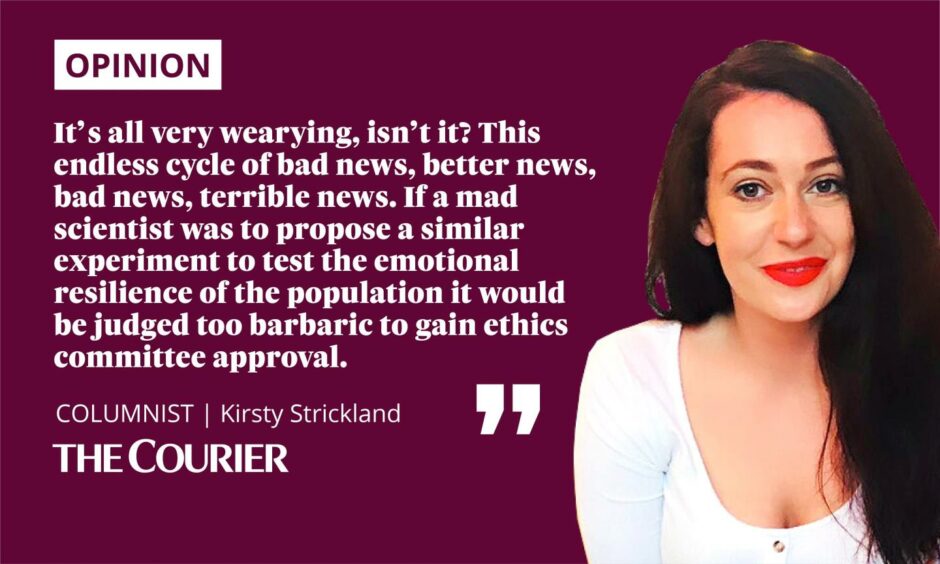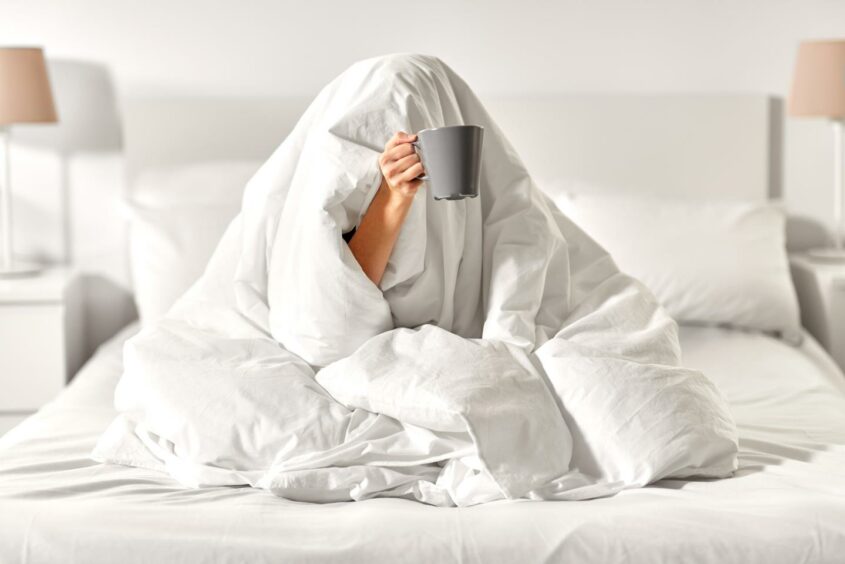On Monday, Nicola Sturgeon held an emergency Covid press briefing.
This came only hours after we learned six cases of the new Omicron variant have been identified in Scotland.
Worryingly, some are not thought to be linked to travel but as a result of community transmission.
The First Minister says Omicron represents “potentially the most challenging development in the course of the pandemic for quite some time’’ and she has urged the public to “step up and increase compliance’’ with existing Covid guidelines.
It all raises the possibility that the tentative normality we’ve been enjoying could be in jeopardy.

While the First Minister didn’t announce the return of severe restrictions, she did stress that she can’t rule out doing so in the future.
We’ll learn more about what – if anything – this means for Christmas, travel and household mixing in the days and weeks to come.
It’s all very wearying, isn’t it? This endless cycle of bad news, better news, bad news, terrible news.
If a mad scientist was to propose a similar experiment to test the emotional resilience of the population it would be judged too barbaric to gain ethics committee approval.
And this near-constant state of uncertainty has taken its toll.
"We are asking people to significantly step up and increase compliance with all existing precautions," says FM Nicola Sturgeon.
Six cases of the Omicron variant have been identified in Scotland.
Live updates ➡https://t.co/6lmf3i1jlQ pic.twitter.com/gpeTR3H5hE
— BBC Scotland News (@BBCScotlandNews) November 29, 2021
The mental health impacts of the pandemic have been well-documented.
Over the course of the last 18 months, numerous studies have shown that as a whole, we’re more stressed and more anxious than we were pre-pandemic.
If your granny is right (and let’s face it, she usually is) then a problem shared is a problem solved.
But what if everybody – to a lesser or greater extent – has the same problem?
A wallow is one way to work things out
We all need support on occasion and sometimes it’s cathartic to talk through your worries.
But sometimes, it’s also nice just to wallow for a bit.
To not feel pressured into finding a diagnosis for your troubles on Google. Or worrying that your lack of action is a sign that this new, gloomy state is permanent.
I am a notorious retreater. It’s almost a bi-annual thing now.
Sometimes, life just feels too noisy.
If I’ve had a lot going on at work or feel in any way frazzled I choose to opt-out for a while.
Necessary. pic.twitter.com/YpvoknH05H
— Kirsty Strickland (@KirstyStricklan) November 29, 2021
This doesn’t involve me lying in bed for days on end wiping my tears with an empty packet of Quavers or anything so dramatic as that.
I just stay away from any communication that isn’t essential.
My words are saved for my daughter, my neighbours and the guy that owns the wee shop on the corner.
And anybody who pays me to write them down, of course.
I delete my social media accounts and messaging apps – without posting a message first to tell everybody, because those kind of announcements usually lead to more people trying to get in touch with you and it defeats the purpose.
The only person I usually give prior warning to about The Big Silence is my mum, because for some reason – known only to her – whenever she sees my Twitter account has gone she assumes I must have blocked her.
As if I’d dare.
We all have ways of coping
My friends know the routine by now. They know that nothing is seriously wrong and that I definitely would not appreciate any unannounced home visits.
Sometimes my retreat from the noise lasts for a week, sometimes three or four.
It lasts for however long I need to feel like myself again.
I’m sure there are other ways of dealing with stress that would be just as effective.
I could learn to knit or practice meditation.
I could try retail therapy or go on dates with unsuitable men.
Some people exercise, others flood their bodies with as many vitamins as it is possible to stuff into one disgusting green juice.
One of the minor irritations of the pandemic has been all the advice about HOW TO COPE.
We are told to buy this, read that and follow a step-by-step plan to feel better about how rubbish everything is.
But there has to be a middle-ground: a lovely scrap of land between the stiff upper-lips and flowery self-care guides.
For me, it is as simple and selfish as ignoring the obligation to be constantly available for communication.
And, as the days grow dark and the doomsday press conferences come thick and fast, I’m starting to feel that urge to retreat again.
Whether your own methods for dealing with stress involve a similar quest for quiet or the noisy, tactile comfort of a group of friends, I think we’ve learned by now that it doesn’t matter what works, just as long as it does.
If there is a silver lining to be found in this miserable week, it is that at this point in the pandemic we’re all becoming well-practised in our own personal coping mechanisms.

